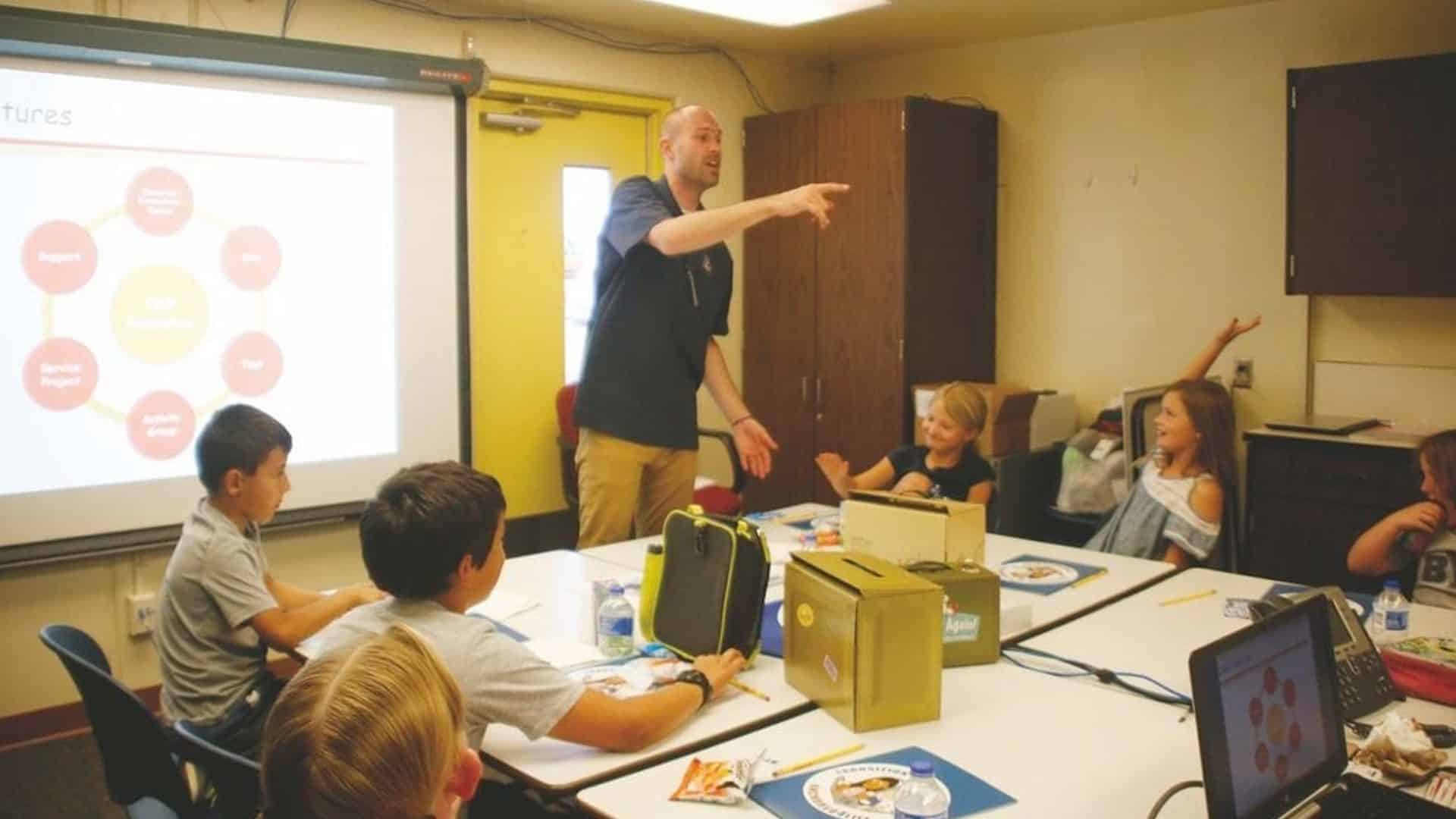Ideas and leadership exercises flew around the winner’s circle room Tuesday morning at Richmond Elementary School — ideas on how to help students who are transitioning to or from another Navy installation or the community, how to build support and service projects.
The ideas came flying from the group of Richmond’s upper-level elementary students who were engaging in the ideas, prompted by trainer Shane Oliva as part of the school’s Anchored4Life program.
Each student had a food-related name such as Klondike, Apple, Egg Burrito or Shrimp — a way to break the ice for dealing with students in transition.
“We like to have the students put themselves in the mindset of a transitioning student, so the names are a kind of icebreaker,” Oliva said. “It’s a way for them to connect as team leaders in this group, but they can take that method forward when there is a new youth here and introduce themselves as, say, Sugar Shane or whoever. Maybe they can give that new youth a nickname and make that connection.”
Oliva works as a trainer for Anchored4Life. The program is a partnership between the Trevor Romain Company and the U.S. Navy meant to foster a comprehensive understanding of transition and resiliency, as military children tend to relocate every one to four years.
The program’s goals for students in military families include reinforcing skills to better connect with other students and the community in a healthy way as they go through the transition of moving or having a military, provide growth opportunities, and build confident leadership skills.
Anchored4Life groups, called Comfort Crews, consist of two comfort crew advisers, or adults who help facilitate peer-led activities, comfort crew leaders consisting of upperclassmen elementary school students, and the crew members themselves – students who provide classroom support to transitioning students.
The Richmond group was going over things like different types of kits that could be provided to students in one type of transition: the welcome kit, the deployment kit, the welcome back kit and the moving kit. Each one had different items, including a DVD, a stuffed bear called Cuzzy Jr., and a journal. Parents and guardians get a resource kit.
“Why is he called Cuzzy?” Oliva asked at one point.
“Because he cares,” the students said in unison.
For classrooms who don’t allow stuffed animals in class because they might be considered toys, the moving box has a “focus coin” — a nod to the Navy’s tradition of challenge coins.
“In the Navy, they are all about coins, so youth can put this ‘focus coin’ in their pocket and when they are missing their friends, they can rub it and focus and remember all the good times from Richmond,” Oliva told the group of students.
The Anchored4Life program has a presence in all six of the Sierra Sands Unified School District elementary schools, Ridgecrest Charter School and Immanuel Christian School, according to Sarah Dastrup, NAWS China Lake’s school liaison officer.
This is a program that doesn’t benefit just military students but all kids in our community,” Dastrup said during Tuesday’s training event at Richmond.
The group of Richmond students also went over things like providing tours to new students — places that the students listed ranged from the restrooms to the cafeteria to the library. And there were the rules on campus to follow.
“Keep your negative thoughts and comments to yourself,” one student said. Another mentioned no shouting in the classroom. “Don’t talk when your teacher is talking,” and “Don’t be afraid to ask a question” were other rules brought up.
A community-oriented component of the Anchored4Life program includes service projects, things that benefit the community. A few schools have done projects like buddy benches or a cleanup at Shooter’s Canyon conducted by Gateway Elementary’s Anchored4Life crew.
The students tossed out ideas that might have benefited the NAWS China Lake community, like reducing paper use, putting up some walls for a wallball court or clean-ups. Service projects support strengthen community ties and increase a student’s self-confidence.
The students also touched on support for other students, meeting a few times a month and inspiring others. Oliva also told the group of students that while their program goes on break during the summer, they can continue acting like team leaders.
“You can always give someone a positive and inspiring message or show someone new around,” he said.
Inspirational quotes are in and of themselves a key tool in the program’s kit. “They are hopeful and inspirational messages that team leaders can share around campus,” Oliva said.
During a roleplaying scenario where the group of students practiced explaining the four different kits to one another, Oliva told the Daily Independent that Tuesday’s session provides the students with invaluable training for being team leaders.
“It is leadership opportunities for these team leaders by giving them six club features,” Oliva said. “And then they are obviously affecting all of their peers on campus.”
He added that the school’s staff associated with the program acts in a support role.
“This club is student-run, student-to-student, and the staff is empowering these youth to have these leadership opportunities,” Oliva said.


